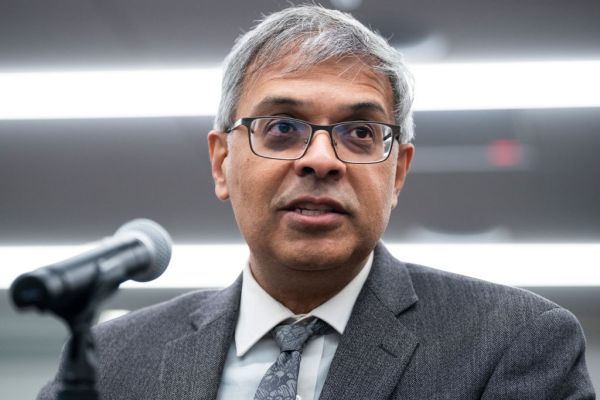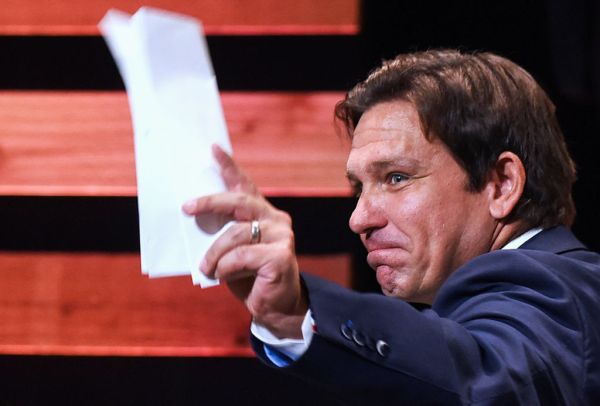Do you know who complains the loudest about self-dealing in the “swamp” of Washington? People who want in on it.
Donald Trump’s “drain the swamp” talk has always been the most cynical kind of public-relations horsepucky. For one thing, Trump was for most of his life a minor swamp creature: not a big player like the National Association of Realtors or those ethanol bastards, but a guy who bragged about buying political favors both in New York and in Washington—it probably says enough to note that he put money into Kamala Harris’ campaign coffers back before he ran against her.
But there is another element in play more serious than mere hypocrisy: Donald Trump is, at heart, a corporatist, and collusion between Big Business and the state is his preferred mode of economic activity. There is a reason he speaks with such undisguised admiration of Beijing’s party-dominated, top-down state capitalism and seems to believe that the U.S. energy industry operates—and should operate—according to the same principles at play in Russia and Saudi Arabia, where politically managed cartels and state-dominated enterprises are superimposed on the markets. Trump is not a free-market guy—he is a guy who assumes that the government’s job is to broker deals encompassing both private profit and public interest. His economics are an illiterate version of something you might take from Émile Durkheim or even Frederick Winslow Taylor. And that isn’t unusual: The notion of treating the overall economy or the nation as a whole as though it were one big factory had more than a little appeal to such titans of American business as Henry Ford and John Pierpont Morgan. The notion that we should “run government like a business” is common Chamber of Commerce stuff—and, perversely enough, it is the heart of Marxism, too. Or so V. I. Lenin thought.
As a practical matter, the corporatist mode always goes along with corruption. And, to no one’s great surprise, the Trump Organization is positioning itself to profit from Trump’s next administration, even to the extent of abandoning its prior commitment to forgoing foreign deals during Trump’s time in the White House. All that talking-to-rubes-in-Midwestern-diners stuff is over: Eric Trump isn’t going to be in rural Maine talking to “real Americans” next week but in Dubai, drumming up business. The Trumps’ crypto venture, World Liberty Financial, already has them in business with a shady Chinese “entrepreneur”—the guy who ate that $6 million banana, currently under fraud and market-manipulation investigation by the SEC.
The first Trump administration was not exactly a paragon of propriety, and the second one will have fewer ethical guardrails than the first.
And, of course, personnel is policy. For all that “drain the swamp” talk, Trump consistently recruits precisely the kind of grasping political insiders and revolving-door careerists he claims to despise, from lobbyists such as attorney general nominee Pam Bondi (whose clients included Amazon and the Qatari state) to a raft of sundry billionaires including hedge-fund chief Scott Bessent, corporate and political insiders of various stripes—the usual suspects. Trump is, of course, a felon, as is Robert F. Kennedy Jr., the conspiracy kook Trump means to put in charge of HHS, while his key trade adviser, straight-up crackpot Peter Navarro, is freshly out of prison. Which is to say, Trump apparently means to “drain the swamp” with lobbyists and hedge-fund bosses, political cronies, and convicted criminals.
I’d bet on the swamp. The swamp’s going to be just fine.
But the real problem isn’t the opportunities Trump’s sycophants and hangers-on will have for grift, nest-feathering, and petty corruption. The big problem is that corporatist philosophy itself. When the ladies and gentlemen who run the state of California sit across the table and “negotiate” deals with the public-sector unions and other entrenched interests—many of them the politicians’ former or future employers and business partners—they aren’t (usually) breaking the law or even violating any particular code of ethics. Neither (usually) are the people who administer programs such as Texas’s economic-development funds, which reliably do a lot of very nice things for people who support the right politicians. What they are doing is (usually) legal, but it is morally wrong and economically destructive, shunting vast streams of capital away from their most productive uses toward ... whatever it is the politicians who control the process and the funds happen to prefer at any moment for any reason. Even with the best of intentions, this way of doing things generally goes wrong–and only a fool could believe that the best of intentions are at work with Trump and his associates.
The notion that the ladies and gentlemen in Washington or any other world capital are like chess masters looking down on some vast chessboard—that they are like the gods playing with figurines in the miniature amphitheater in Clash of the Titans—is one of the most destructive delusions in the history of political ideas. Healthy economies and societies are organic and constantly in flux, responding to information that is local and specific and contingent and as ungraspable as quicksilver. We have seen the man-behind-the-curtain model of politico-economic life fail a thousand times in a thousand contexts. The same con artists and fanatics promise efficiency and rationality, fairness, competitiveness vs. our foreign rivals, and reforms that will “drain the swamp.” And what do they deliver?
More swamp.







Please note that we at The Dispatch hold ourselves, our work, and our commenters to a higher standard than other places on the internet. We welcome comments that foster genuine debate or discussion—including comments critical of us or our work—but responses that include ad hominem attacks on fellow Dispatch members or are intended to stoke fear and anger may be moderated.
With your membership, you only have the ability to comment on The Morning Dispatch articles. Consider upgrading to join the conversation everywhere.